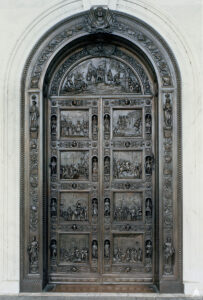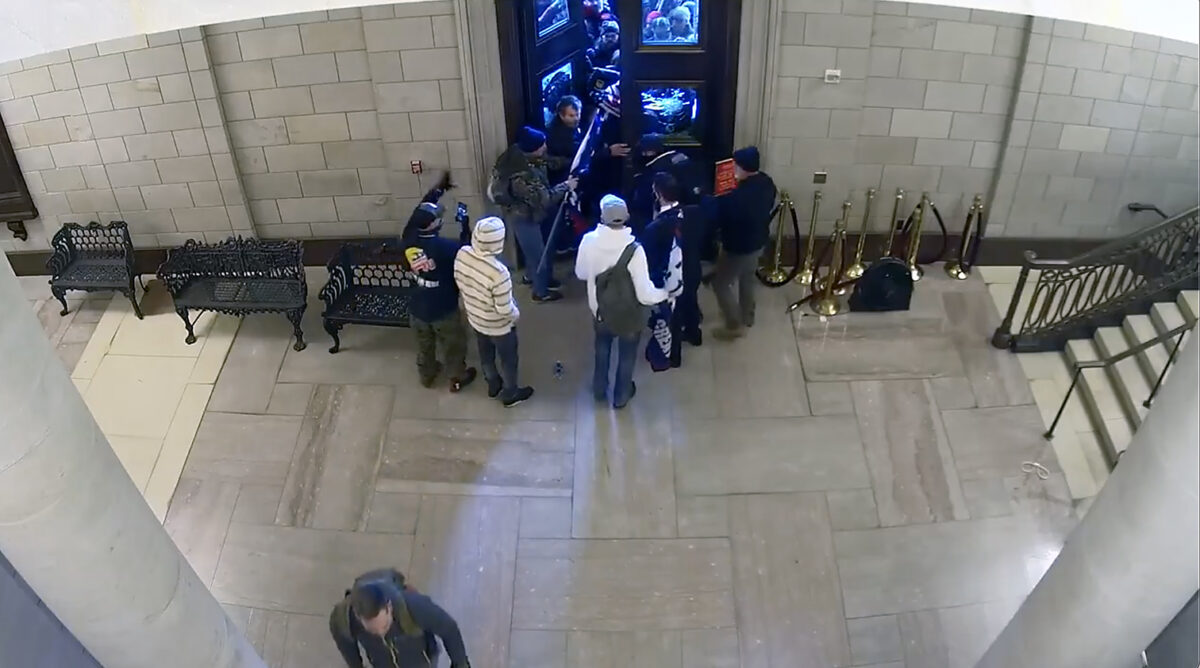Kelly Meggs and other members of the Oath Keepers could not have done one of the major things of which they are accused by federal prosecutors: force their way into the U.S. Capitol Rotunda on Jan. 6, 2021, through the famous Columbus Doors, a defense attorney says.
The two sets of historic doors that lead into the Rotunda were opened by someone on the inside, and not his client, says defense attorney Jonathon Moseley.
Department of Justice video widely circulated on Twitter this week shows a man trying to open the inner doors by leaning against them, before turning around as if listening to someone, then returning to the entrance and opening the left door for protesters.
“The outer doors cast from solid bronze would require a bazooka, an artillery shell, or C4 military-grade explosives to breach,” Moseley wrote in a letter to federal prosecutors. “That of course did not happen. You would sooner break into a bank vault than to break the bronze outer Columbus Doors.”
The 20,000-pound Columbus Doors that lead into the Rotunda on the east side of the U.S. Capitol are secured by magnetic locks that can only be opened from the inside using a security code controlled by Capitol Police, Moseley wrote in an eight-page memo.
‘Impossible and Cannot Be Done’
“Imagine how the prosecution will prove at trial what cannot be proven because it is not true,” Moseley wrote to prosecutors Jeffrey S. Nestler and Kathryn Leigh Rakoczy of the U.S. Attorney’s Office for the District of Columbia.
In court, “who is going to testify that the defendants entered the Columbus Doors when the U.S. Capitol Police will begrudgingly testify that that is impossible and cannot be done?” Moseley wrote.
In a superseding indictment on Jan. 12, 2022, Meggs and 10 other members of the Oath Keepers were charged with seditious conspiracy, destruction of government property, obstruction of an official proceeding, civil disorder, tampering with documents, and other counts related to rioting on Jan. 6.
The indictment charges that Meggs led a “stack formation” up the Capitol steps to the entrance at the Columbus Doors. At 2:39 p.m., the doors were breached, and Stack One entered the Capitol with the mob, the indictment said.
Moseley said there’s one big problem with that accusation: it’s impossible to force entry from the outside. Only someone with the security code could release the locks—from the inside.
Video evidence submitted in the case showed the glass panes in the inner doors were cracked but intact, so no one accessed the building through the windows or by reaching for the inside door handles, he said.
“Therefore,” Moseley wrote. “Nobody opened the Rotunda doors from the outside. Someone opened the doors from the inside.”
Video shot by multimedia journalist Michael Nigro shows the outer bronze doors were partially retracted before a large crowd gathered outside the entrance.
The inner doors were closed and U.S. Capitol Police were stationed outside. Protesters sprayed police with pepper spray, threw items at them, and hit them with flagpoles.
A short time later, the inner doors were opened and hundreds of protesters streamed into the Rotunda, the video shows. A protester in the Rotunda is heard shouting, “Don’t vandalize the property!”
Capitol Tour Confirms Door Security
American sculptor Randolph Rogers designed the solid-bronze doors to depict scenes from the life of explorer Christopher Columbus. The doors were first installed in 1863, moved in 1871 to the central east entrance, and moved to the current location in 1961.
The doors are 17 feet high and weigh 20,000 pounds, according to the Architect of the Capitol. Once opened, the giant doors retract into pockets in the walls via built-in tracks.
First installed in 1863, the historic Columbus Doors depict scenes from the life of explorer Christopher Columbus. (Architect of the Capitol)
Moseley asked federal prosecutors for “any and all specifications, details and operational information about the so-called Columbus Doors.”

Moseley said he and an assistant took a tour of the Capitol on Jan. 22, along with other attorneys and investigators. The U.S. Capitol Police officers on duty were emphatic, he said, that the doors could not be opened from the outside.
“These are facts that in the supposedly largest nationwide investigation in the history of the U.S. since the kidnapping of the Charles Lindbergh baby or the search for Al Capone could easily have been investigated, check(ed), and determined before the U.S. Attorney’s Office presented false information to the grand jury,” Moseley wrote.
“For these purposes, I don’t care who opened the Columbus Doors from the inside, or why, or who they worked for. History will reveal all of that,” Moseley wrote. “History will care very much. But all I care about is that it wasn’t my client or any of these defendants, and the U.S. Attorney’s Office knows that or should have discovered it upon reasonable investigation.”
Asked the U.S. Attorney’s Office for the District of Columbia for comment on Moseley’s letter but received no reply.
The superseding indictment said Meggs and four other Oath Keepers became part of a mob that “aggressively advanced toward the Rotunda Doors, assaulted the law enforcement officers guarding the doors, threw objects, and sprayed chemicals toward the officers and the doors and pulled violently on the doors.”
The mob breached the Rotunda entrance around 2:39 p.m., the indictment alleges.
Nigro’s video from outside the entrance shows a group of Oath Keepers near the Columbus Doors, which are clearly open at the time the men got near the threshold. By the time they entered the Capitol, dozens if not more than 100 people had flowed into the building, the video shows.
‘Baseless Prosecution’
Moseley accused prosecutors of crafting a “fabricated case” against the Oath Keepers that is “false and reprehensible.”
“This baseless prosecution is the greatest threat to the Republic since 1812. This prosecution is not about an attack on our Republic. This prosecution IS the attack on our Republic,” Moseley wrote, “seeking to criminalize political dissent, free speech, freedom of assembly, freedom of political association, and the right to petition the government for the redress of grievances.”
Moseley rapped federal authorities for “dishonestly trying to deceive the public” for eight months by concealing the fact that six demonstration permits had been issued for the Capitol grounds on Jan. 6. Implicit in those permits is the permission for people to have ingress and egress across the grounds to reach each event, he said.
This baseless prosecution is the greatest threat to the Republic since 1812. — Jonathon Moseley
Moseley proposed a stipulation that both sides in the case agree none of the demonstrators or the defendants opened the Columbus Doors on Jan. 6 and that the government strike three paragraphs of the indictment that refer to defendants entering the Capitol because they are “untrue and withdrawn.” Prosecutors refused that proposal, he said.
News of the Columbus Doors issue comes as more video released from the protective court seal shows large groups of Jan. 6 protesters peacefully streaming into the U.S. Capitol through wide-open doors. Among them was Rabbi Mike Stepakoff, who spent about five minutes inside the Capitol, doing nothing more than looking around and taking photos.
On his way out, Stepakoff stopped to shake hands with a police officer, “told him to thank you for his service, we love you, and God bless you,” according to his attorney, Marina Medvin.
Rabbi Stepakoff was charged with entering and remaining in a restricted building, disorderly and disruptive conduct in a restricted building, violent entry and disorderly conduct in a Capitol building, and parading, demonstrating, or picketing in a Capitol building, all misdemeanors.
Stepakoff pleaded guilty to the parading charge and received 12 months of probation. The other charges were dismissed, Medvin said in a statement. The government sought to punish him with a jail term “for events he did not partake in, for destruction and violence he did not witness, for severity he did not experience, and for an effect, he did not cause nor could foresee,” Medvin said.

